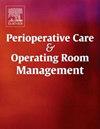Assessing the relationship between knowledge, attitude, and practice toward hepatitis C virus among medical waste handlers in Sidama, Ethiopia: A structural equation modeling approach
IF 1
Q2 Nursing
Perioperative Care and Operating Room Management
Pub Date : 2025-09-23
DOI:10.1016/j.pcorm.2025.100558
引用次数: 0
Abstract
Background
Medical waste handlers are highly exposed to hepatitis C virus. Assessing their knowledge, attitude, and practice is essential for prevention. This study examined their knowledge, attitude, and practice toward HCV using structural equation modeling.
Methods
A cross-sectional study was conducted among 282 medical waste handlers in Sidama region, Ethiopia from Oct 2021 – July 2022. Data were collected by structured questionnaire. Reliability and validity were confirmed. Descriptive statistics and structural equation modeling were performed using STATA 14 software.
Results
The study showed 55.1 %, 95 % CI: (50.23, 60.96) had good knowledge, 63.5 %, 95 % CI: (58.60, 65.70) had favorable attitude and 51.9 %, 95 % CI: (49.40, 55.43) had good practice. Knowledge significantly influenced both attitude and practice, while attitude had a direct effect on practice. Knowledge also exhibited a significant indirect effect (= 0.11, 95 % CI= (0.008, 0.212), p = 0.035) and a total effect (= 0.50, 95 % CI= (0.198, 0.802), p = 0.002) on practice through attitude. Additionally, frequency of reading newspapers, watching TV, listening to the radio, internet usage, years of experience, age, and monthly income had significant indirect and total effects on attitude through knowledge. Similarly, these variables, along with household size, had significant indirect and total effects on practice through knowledge.
Conclusion
Knowledge is critical to improving both attitudes and practices toward HCV prevention. Training programs, media campaigns, and socioeconomic improvements are recommended.
评估埃塞俄比亚Sidama医疗废物处理人员对丙型肝炎病毒的知识、态度和实践之间的关系:结构方程建模方法
医疗废物处理人员高度暴露于丙型肝炎病毒。评估他们的知识、态度和行为对预防至关重要。本研究使用结构方程模型考察了他们对丙型肝炎病毒的知识、态度和实践。方法于2021年10月至2022年7月对埃塞俄比亚Sidama地区282名医疗废物处理者进行横断面研究。采用结构化问卷法收集数据。验证了信度和效度。采用STATA 14软件进行描述性统计和结构方程建模。结果55.1%、95% CI为(50.23、60.96),63.5%、95% CI为(58.60、65.70),51.9%、95% CI为(49.40、55.43)。知识对态度和实践均有显著影响,而态度对实践有直接影响。知识通过态度对实践也表现出显著的间接影响(β^= 0.11, 95% CI= (0.008, 0.212), p = 0.035)和总影响(β^= 0.50, 95% CI= (0.198, 0.802), p = 0.002)。此外,读报频率、看电视频率、听广播频率、网络使用频率、经验年数、年龄和月收入对态度有显著的间接和总影响。同样,这些变量,连同家庭规模,通过知识对实践有显著的间接和总影响。结论知识对于提高对HCV预防的态度和实践至关重要。建议进行培训计划、媒体宣传和社会经济改善。
本文章由计算机程序翻译,如有差异,请以英文原文为准。
求助全文
约1分钟内获得全文
求助全文
来源期刊

Perioperative Care and Operating Room Management
Nursing-Medical and Surgical Nursing
CiteScore
1.30
自引率
0.00%
发文量
52
审稿时长
56 days
期刊介绍:
The objective of this new online journal is to serve as a multidisciplinary, peer-reviewed source of information related to the administrative, economic, operational, safety, and quality aspects of the ambulatory and in-patient operating room and interventional procedural processes. The journal will provide high-quality information and research findings on operational and system-based approaches to ensure safe, coordinated, and high-value periprocedural care. With the current focus on value in health care it is essential that there is a venue for researchers to publish articles on quality improvement process initiatives, process flow modeling, information management, efficient design, cost improvement, use of novel technologies, and management.
 求助内容:
求助内容: 应助结果提醒方式:
应助结果提醒方式:


